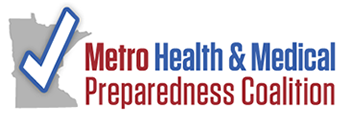
The Coalition
The Coalition is comprised of the Metro Hospital Compact, Clinics, Emergency Managers, Emergency Medical Services, Long Term Care, Public Health and Hospice and Home Care. If you or your organization would like to join the Coalition, please fill out our Membership Form.
Purpose
The goal of the Metro Health & Medical Preparedness Coalition is to facilitate integrated planning, response and recovery activities critical to an effective response to an event or emergency with public health and medical implications in the metro area.
Scope
Within the parameters of statutory requirements and jurisdictional Emergency Operations plans, and as outlined in operational support compacts, mutual aid agreements, memoranda of understanding or other operational agreements, the Coalition will support public health and medical response and recovery to include, but not limited to:
- Provide regional coordination of planning, training and exercising for metro health and medical entities;
- Provide health and medical situational information to support a regionally coordinated response;
- Facilitate health and medical resource sharing through multi-agency coordination;
- Address the appropriate capability targets as defined by Emergency Management, Public Health and Healthcare.
Authority
The Metro Health & Medical Preparedness Coalition has no specific legal authority. Each entity represented has discipline specific authority and will integrate that authority to coordination and leverage planning and response.
- MN State Statue Chapter 12 – Emergency Management
- Minnesota Public Health Act (MN Stt.145A) outlines the shared public health responsibilities of the state and local governments in Minnesota.
- MN Department of Health – MN Emergency Operations Plan
- Local authority as embodied in local EOPs or local jurisdictional plans (Public Health)
- Voluntary agreements for regional coordination of the Metro Hospital Compact
- Voluntary agreements among Regional EMS providers for regional coordination for EMS activities
Tying into a National Effort
FEMA’s National Response Framework (NRF) presents guiding principles for all response partners to coordinate and act strategically in response to disasters and emergencies – from the smallest incident to the largest catastrophe. The NRF includes 15 Emergency Support Functions (ESFs); the Coalition is the metro area’s arm of ESF#8, which addresses Public Health and Medical Services for State, Tribal, and jurisdictional governments in Minnesota.
Acting Regionally is Key
Working at local level maintains a regional intersection between public health, emergency medical services, healthcare, and public safety. Hennepin County Medical Center (HCMC) is responsible for the administrative management of the Healthcare System Preparedness Program. As the designated Regional Hospital Resource Center, HCMC manages the Regional Hospital Preparedness Coordinators, Medical Director, and grant support staff, with an emphasis on coordinating participation in the Coalition.
Response Partners
Metropolitan Emergency Managers Association (MEMA)
Metropolitan Emergency Services Board
Minnesota Department of Health Office of Emergency Preparedness
Emergency Medical Services Regulatory Board (EMSRB)
Homeland Security and Emergency Management (HSEM)
Minnesota Responds (Medical Reserve Corp)
Response partners also include the following counties: Anoka, Carver, Dakota, Hennepin, Ramsey, Scott and Washington, and the cities of Minneapolis, Bloomington, Edina and Richfield.
Sponsors
Healthcare Preparedness Program (HPP)
